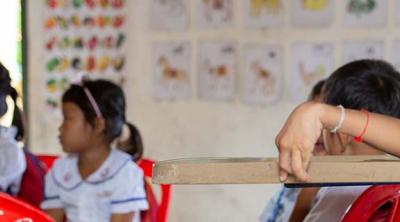CRS in Vietnam
CRS began working in Vietnam in 1992 and established an office in Hanoi in 1994. CRS Vietnam assists local counterparts including government partners and civil society organizations to build capacity in the areas of inclusion of people with disabilities, Mine Risk Education and victim assistance, Disaster Risk Reduction and climate change adaptation. CRS Vietnam currently works in eight provinces including: Hanoi, Quang Binh, Quang Tri, Thua Thien Hue, Quang Nam, Da Nang, Binh Dinh and Tien Giang. CRS Vietnam works closely with its sub-regional hub office in Phnom Penh, Cambodia which covers Cambodia, Myanmar, Laos, Vietnam, and other countries. In the 2020 fiscal year alone, CRS directly benefited 591,932 people and indirectly supported 1,715,358 people living in Vietnam.
Disability Inclusion Program
Over the past twenty years, CRS/Vietnam program has directly supported the inclusion of children and persons with disabilities through various projects. CRS has been a pioneer in bringing the inclusion of children with disabilities in education sector, demonstrating a great success in vocational training and placing youth with disabilities in high-capacity information technology roles. More than 10,000 children with disabilities experienced inclusive education, contributing to the increase of enrollment rate of children with disabilities to 70% (some areas with higher percentages), compared to the general rate of lower than 50%. An estimated 500,000 children with disabilities have been enrolled in mainstream schools nationwide following the reformed educational policies, regulations and capacity building activities contributed to by CRS. Through the final project evaluation, the long-term improvement in well-being of children has been demonstrated. Children have gained confidence and opportunities to participate in educational and other social activities with other non-disabled peers. More than 1,450 youth with disabilities received vocational training and almost 70% of them have high-paying jobs in the information technology sector.
Since 2005, CRS has supported the inclusion of children and persons with disabilities in a comprehensive approach through health intervention, inclusive education, vocational training and employment CRS also builds the capacity of sector staff and networks along with policy advocacy and development.
In the rehabilitation and health sector, CRS has a variety of experience in home-based care, community-based rehabilitation, provision of assistive devices and capacity building for health staff in rehabilitation. As a result, thousands of children and adults with disabilities have changed their attitudes towards their capacity, gained confidence and increased their participation in social activities.
Key highlights from the disability program over the past 10 years (2011-2021):
-
More than 5,800 children with disabilities directly benefited from inclusive education and direct support activities from CRS supported projects.
-
More than 1,450 youth with disabilities participated in vocational training and job placement program with more than 60% of graduates accepting employment offeres.
-
More than 10,000 children with disabilities indirectly benefited from the improved inclusive education program nationwide.
-
The most significant impact of CRS’ inclusive education efforts is widely seen as increased enrollments of children with disabilities in inclusive classes: directly in focus districts, and indirectly through policy development, advocacy and awareness raising nationwide. This has taken place through great efforts of thousands of children, families, and schools. It is important that families and communities change their awareness, building their confidence in the potential of children with disabilities and supporting their children’s development.
-
Information Communication Technology brings opportunities for children with disabilities to access higher levels of education and improve their learning quality.
-
CRS worked closely with Ministry of Education and Training to mainstream inclusive education into the regular policies and guidelines. Over 20 guidelines and regulations were revised to highlight the inclusive education requirement for children with disabilities such as the revision of requirements on school charters at all three levels of preschool, primary and secondary education and development of guidelines on school transition for children with disabilities. At higher national level, the project contributed significantly to the revision of the education law and in the law on persons with disabilities (2010) with a focus on educational and vocational training and employment issues.
-
CRS Training on technical subjects and on attitudes and awareness towards persons with disabilities was of a high quality. Over 2,600 teachers and key educational managers from Ninh Binh and QuangNam directly received inclusive education training and in-depth disability thematic training courses from 2006 to 2009. Additionally, 963 key educational resource staff at preschool, primary and lower secondary educational levels from 63 provincial Departments of Education and Training received training facilitated by the Ministry of Education and Training during 2006 to 2009.
-
The project developed an inclusive education module to be mainstreamed in the regular pre-service teacher training courses and the core curriculum in special education for teacher training colleges and universities. This fostered the implementation of pre-service and in-service training for teachers and education officials and managers nationwide to improve the implementation of inclusive education at school level.
-
CRS and Ministry of Education and Training also produced an array of teaching and in-service teacher training materials on inclusive education. As many as 18,000 copies were published of a 2007 handbook for classroom teachers, a manual on inclusive education management, a handbook on hands-on activities for preschool inclusive education, a guide on model of inclusive education at lower secondary level etc. These materials are assessed as high quality and are valued by Ministry of Education and Training.
-
The project has showed clearly the importance of family and community engagement in promoting right to education of children with disabilities through the establishment and operation of parent associations at the community level. During the project, 51 parent associations were established with participation of around 4,000 members. Parents’ attitudes and actions have great influence on children’s quality of life and whether children with disabilities go to school or not. They have also demonstrated ability to talk about needs of their children to schools and other sectors and to collaborate with teachers, schools and community networks for support services for their children.
-
CRS has entered partnership with different stakeholders from National Committee on Disabilities (NCD); Ministry of Education and Training, Ministry of Labor, Invalids and Social Affairs, provincial and district people committee, Organizations of Persons with Disabilities, universities, private sectors and local non-government organizations in implementing projects and influence for government policy changes. From 2018 to present, CRS has expanded its partnership to health sector partners from central to provincial, district and community level, promoting interdisciplinary rehabilitation systems and home-based care for persons with severe disabilities. Since 2018, more than 600 persons with severe disabilities have received home-based care support, and devices to enable them to improve their functions and referral for health care and rehabilitation services.
-
Key donors: USAID, Caritas Australia, DFAT.
-
Geographic locations: Binh Dinh, Quang Nam, Quang Tri, Hanoi and Ninh Binh provinces.
Summaries of Key Projects
-
Social inclusion of people with disabilities through civil society action, with funding support from Irish Aid, $517,000, implemented from 2016-2017 in Hanoi and two provinces in Vietnam provided support to 4,481 direct participants and 20,313 indirect beneficiaries. This project focused on two objectives: development of organization of persons with disabilities, associations of parents of children with disabilities, and linkages for improved fundraising and social service access. Project activities including home-based teaching, vocational training, and network strengthening. The project was implemented in Quang Tri, Quang Nam, Hanoi and Ninh Binh provinces.
-
Through the USAID-funded Inclusion of Vietnamese with Disabilities Program (2005–2015, total budget of $8,856,623), CRS provided technical assistance to the government to implement inclusive education, mainstream youth with disabilities activities in government-run vocational training centers and secondary schools. Additionally, CRS informed the development of 10 government legal documents and policies on disabilities, education and vocational training for people with disabilities. The project focused on holistic support of persons with disabilities from disability identification, disability screening examination, early interventions in areas of education, health intervention and social activity support), inclusive education, vocational training and job placement, and through advocating for and development of the inclusive disability policy, system strengthening, direct support to persons and families of persons with disabilities and public communication. In Ninh Binh and QuangNam, the enrollment rate for children with disabilities increased to 60-70%. Approximately 6,500 children with disabilities in Ninh Binh and QuangNam provinces accessed education at preschool, primary and junior secondary levels; 6,498 teachers and administrators were trained on inclusive education from all 64 provinces; 40 parent associations were established; 1,450 youth with disabilities graduated from information technology training program, 202 primary students participated in ICT distance learning pilot. CRS is the first NGO in Vietnam to have engaged in this area of educational development using ICT while successfully handing over implementation to the Ministry of Education and Training.
-
Capacity Building for Parent Association Project (2008-2016), $696,000 Caritas Australia and CRS. Strengthened 45 parent associations to support over 1,500 children with disabilities to access education, health and other rehabilitation services in QuangNam, Ninh Binh and Binh Dinh.
-
Inclusion of children with disabilities through joint actions by local government and civil society organizations (2016-2019), AUD $475,000 (US$309,000) by Caritas Australia. Support the inclusion of 493 children with disabilities and other 2,493 beneficiaries such as teachers, parents, community members, representative of parents association and organizations of persons with disabilities in 25 communes in QuangNam and Quang Tri provinces.
-
I-SHINE” – Improving Social, Healthcare Inclusion and Education of children and youth with disabilities through joint actions by local stakeholders and network, Caritas Australia and DFAT, AUD 750,000 (2019-2021). The project focuses on enhancing quality of life of children with disabilities through health, education, and social services. The project activities focus on early identification; disability screening examinations; health interventions including provision of assistive devices (hearing aids, orthopedic devices), rehabilitation referrals; inclusive education with special direct support to children with intellectual disabilities (children with autism, children with learning disabilities, children with intellectual disabilities) through individualized lessons; building capacity of teachers, health staff, parents, members of organizations of persons with disabilities, community and partners; vocational orientation for youth with disabilities with focus on youth with intellectual disabilities; support to livelihoods for families of children with disabilities; and mobilize local resources by facilitating the joint action of local government and all stakeholders including businesses. The project is currently implemented in QuangTri and Quang Nam provinces.
-
A sustainable interdisciplinary rehabilitation model in Binh Dinh and Quang Nam provinces, Vietnam (2018-2021), US$ 883,150 by USAID through the prime organization of the Institute of Population, Health and Development. The project aims to develop a sustainable interdisciplinary rehabilitation model in the provinces through support directly 600 persons with severe disabilities with home based palliative care and 1,400 other persons with severe disabilities with rehabilitation services in provincial and district hospitals. The project aims to support at least ten hospitals and in twenty communes in four districts in QuangNam and Binh Dinh provinces.
Under the project implementation framework taken by CRS, the project focuses on providing a 12-month training in occupational therapy for 13 hospitals and facilities at provincial and district levels; a follow up support for six months of mentoring at sites; development of home-based care training curriculum and materials, training and direct training for family caregivers of persons with severe disabilities, monthly follow up and monitoring of progress of home-based care of persons with disabilities through the use of app namely RedCAP; monthly meeting to follow up on progress and recommendations from caregivers and collaborators; and home-based assessment of home environment and assistive devices to support the activity daily living of persons with severe disabilities and provision of ADL devices. The project also focuses on provision of GBV training to health staff, family caregivers, local monitoring teams and follow up with cases requiring in-depth support as results of GBV. Finally, the project builds awareness of families and community in disability inclusion, rights of persons with disabilities, multiple rehabilitation approach (physical therapy, occupation therapy, speech therapy) to health system leaders and staff and community. CRS also involves in networking with National Disability Committee (NCD) technical working team to advocate for changes of law on persons with disabilities and relevant issues relating to inclusive education, strategic rehabilitation and social inclusion of persons with disabilities. CRS is currently a member of disability working group and child right working group.
Mine Risk Education Program
According to Vietnam’s Ministry of Defense, the central provinces from the former demilitarized zone southward are the most affected by landmines and unexploded ordnances with 100% of communes still contaminated. Since the end of the war in 1975, 100,000 accidents have occurred. Tragically, children are often the most at-risk.
Since 2001, CRS has contributed to the reduction of injury and death from explosives in high-risk communities of Quang Binh, Quang Tri, Thua Thien Hue, Da Nang, and Quang Nam provinces. CRS provides direct support to children. In collaboration with the provincial-level Departments of Education and Training, CRS has developed a Mine Risk Education curriculum for grades 1-9 as well as Integration Guidelines that have been adopted and mainstreamed by the Departments of Education and Training into other subject areas. In 2020, CRS had trained over 12,607 teachers and 560,589 school children on mine risk education, and while these numbers are impressive, the effectiveness of the project is evident in one particular achievement – no accidents have occurred in the project sites since early 2020.
Since early 2021, CRS has cooperated with Vietnam Mine Action Center to develop the national strategy and standards on MRE, which helps to strengthen the coordination of activities and resources nation-wide. The strategy and standards are being drafted and scheduled to be completed, then approved by end of this year.
Disaster Risk Reduction and Climate Change Adaptation Program
Being one of the countries most affected by climate change and having a coastline stretching 3,440 km, combined with a diverse and complex topography, Vietnam suffers from many different types of natural hazards with increasing intensity and unpredictable, extreme events. These are both hydrometeorological (e.g. Typhoon, floods, heavy rainfalls and droughts) and geophysical (e.g. landslides). It is estimated that approximately 70% of the country’s 98 million people living in coastal areas and low-lying deltas in Vietnam, are exposed to the risk of flooding. Only in October 2020, the Vietnam Disaster Management Authority has recorded 230 people dead or missing, approximately 196,000 houses collapsed/damaged; over 400,000 houses flooded. Damage is expected to total $430 million, exacerbated by the economic effects of the COVID-19 pandemic, which has caused an estimated loss of nearly $1.2 million to Vietnam’s budget revenue.
Since 1999, in partnership with the Department of Science, Technology and International Cooperation, the Department of Community-Based Disaster Risk Management and Disaster Management Policy and Technology Centre – Vietnam Disaster Management Authority, Natural Disaster and Prevention Committee, and sub-national authorities, CRS has working to increase resilience of more than 1 million people in the vulnerable communities across Central Vietnam and Mekong Delta to prepare for and mitigate the adverse impact from disasters and climate change by applying the following technical approach:
-
Work with local government and communities on “Community Awareness and Disaster Risk Management,” or the Prime Minister issued Decision 553 which calls for inclusive rural and semi-urban/urban community-led disaster risk management;
-
Pilot customized agro-climate forecast and information systems so that farmers can adapt crop patterns to reduce loss and/or increase yield;
-
Promote climate change adaptation measures like community-based models for mangrove regeneration, protection, and maintenance to help communities and local authorities reduce the environmental impact when severe weather occurs; and
-
Prioritize its capacity building to response to emergencies, when appropriate, within 2-weeks of a crisis with quality cash programming at scale to meet the life-saving needs, disaster resilient shelter and any unique challenges the community faced.
Stats
People Served: 713,308
Population: 96,160,163
Size: 127,243 sq mi; equivalent in size to Ohio, Kentucky, and Tennessee combined
Our Partners
Become a Partner ›Programming Areas
CRS' History in Vietnam
Catholic Relief Services has worked in the Socialist Republic of Vietnam since 1992 and has had an office in Hanoi since 1994. CRS works in partnership with government counterparts, as well as other community organizations, to build their capacity to transform the lives of the poor through effective programming. We use evidence-based approaches to achieve maximum impact, good stewardship of resources, and transparency and accountability to beneficiaries and stakeholders.







